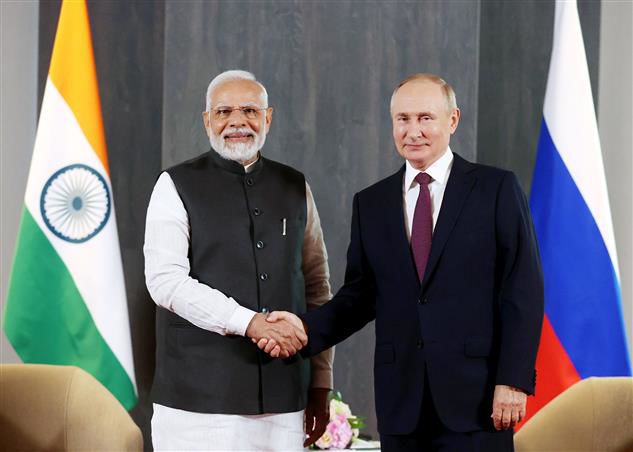PM Narendra Modi, Russian President Vladimir Putin likely to ink ‘vision paper’; to discuss regional ties
Jyoti Malhotra in Moscow
Prime Minister Narendra Modi and Russian President Vladimir Putin will likely sign a “vision document” that spells out a roadmap for India and Russia in the decades to come, when the PM arrives in the Russian capital for a day-long visit on July 8.
In an exclusive interview with The Tribune in his office in the Russian ministry of foreign affairs in Moscow, Russian point person for South Asia Zamir Kabulov said, “Russia is looking forward to welcoming (your) Prime Minister. We believe it will be a very important meeting between the two leaders.”
On the margins of the Primakov Readings, a summit of ideas and intellectuals organised by Russia’s prestigious Primakov Institute of Global Economy & International Relations in Moscow, its president Alexander Dynkin said, “It is significant that India’s Prime Minister is choosing Russia for his first (bilateral) visit abroad after he was elected the PM for the third time.”
Certainly, Modi’s visit to Moscow will be watched keenly by the US, whose National Security Adviser Jake Sullivan was in Delhi for talks less than a fortnight ago, for signals as to how far India is leaning towards Russia.
But even the Americans understand the pragmatic reality on the ground, which is that the Russian invasion of Ukraine and the subsequent sanctions imposed by the West on Russia has enabled India to take advantage of the situation.
That India has bought such large quantities of oil from Russia in these past two years that it has not only replaced Saudi Arabia as India’s largest oil importer, but also India’s purchase of this cheap Russian oil enabled it to refine it at Indian refineries at home, add a percentage of profit and re-export it to European refineries — the same refineries which were prevented from buying from Russia because they would be sanctioned if they did.
During his exhaustive interview with The Tribune, Kabulov, who is also the Russian presidential envoy for Afghanistan, also spoke at length about why Russia is internally debating the removal of the “terrorist tag” from the Taliban in Kabul. He said the Russian embassy in Kabul is fully open (“it never shut down”), that a Russian ambassador continues to hold fort there and that he, Kabulov, had talks about this matter with Indian officials during his visit to New Delhi last month.
“We need to recognise the reality on the ground in Afghanistan,” Kabulov said, adding, “which is, that the Taliban are in power.”
Asked if Russia would recognise the group and push for its integration into the world community, that this would include a seat at the UN General Assembly — despite the Taliban’s abysmal record on human rights and the maltreatment of its own women — Kabulov said, “Yes, we think so. We cannot presume to tell the Taliban how to run their country.”
On the Modi visit, Kabulov said the “vision document” was not just about weapons or the continued purchase of cheap Russian oil, but much more. “It is about how both nations can help each other on the industrial and scientific front,” he said.
“Putin will discuss all important issues with your PM for our two nations…Geopolitics, regional, bilateral, economic relations and whatever else they decide to talk about. We have very close relations and they are quite open in talking to each other,” Kabulov added.
But he didn’t hesitate to point out that while Russia understands India’s growing proximity to the US, he said Moscow hoped that “this won’t be done at the expense of relations with Russia”.









